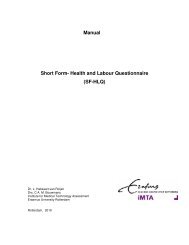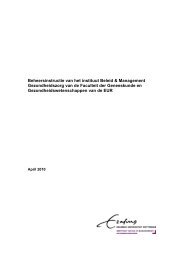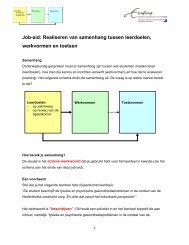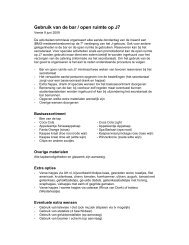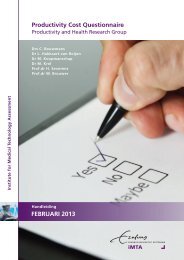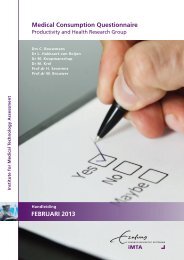Marten J. Poley - Erasmus Universiteit Rotterdam
Marten J. Poley - Erasmus Universiteit Rotterdam
Marten J. Poley - Erasmus Universiteit Rotterdam
- No tags were found...
You also want an ePaper? Increase the reach of your titles
YUMPU automatically turns print PDFs into web optimized ePapers that Google loves.
Introduction 3practices that are known to have favorable effects, but for which the magnitudeof the effects is too small to justify the cost. This may be difficult to accept, sinceit contradicts the wide-spread feeling that a procedure that works and isbeneficial must be affordable, a mind set that has been termed 'the efficacyfallacy'. 2Despite the uncomfortableness that doctors may feel regarding the situation ofscarcity, it is the 'raison d'être' of economics. Economic evaluations of health careare defined as the comparative analyses of alternative courses of action in termsof both their costs and consequences, given the reality of limited resources. 4,5 Putsimply, they aim at establishing whether the effects of a given treatment areworth the budget needed, compared to an alternative treatment. It is aboutgetting the optimum benefit for a given set of resources. The value of suchevaluations springs from the fact that behind every patient there are otherpatients and even healthy people (i.e., future patients) waiting who also have aclaim to a reasonable amount of scarce health care resources. Or, to quoteWilliams, one of the founding fathers of health economics: "Anyone who says thatno account should be paid to costs is really saying that no account should be paidto the sacrifices imposed on others". 6 All other things being equal, society isbetter off when resources are used efficiently, as otherwise possible healthbenefits for society will not be realized. Moreover, resources that are spent onhealth care cannot be expended on other sectors of society such as education,road safety, or national defense, while people might find that these offer morevalue for money.For the case of neonatal surgery, results from cost-effectiveness analyses wouldmake it possible to counteract critiques that have been leveled against thediscipline. Neonatal surgery has been criticized with arguments of costeffectiveness:it has been feared that the high costs of an operation would comewith low HRQoL after survival. 7 Extracorporeal membrane oxygenation (ECMO),which is available as a treatment option for acute respiratory failure in selectedneonates, is only one but a very typical example. Some 21,000 neonates havebeen treated worldwide since the initiation of the ECMO procedure. 8 Yet, thebenefits of this complicated and potentially hazardous treatment have alwaysbeen considered controversial—and still are—also in view of the high costsassociated with this labor-intensive technique. So, evidence on the costeffectivenessof neonatal surgery clearly would be welcome. It would enable us tofind out what is the most cost-effective strategy for managing a specific condition,and how cost-effective a treatment is in comparison with interventions for othercongenital anomalies or interventions outside neonatal surgery.Current evidenceNowadays, many medical technologies have been assessed on their costeffectiveness.9-12 However, this is not true for neonatal surgery. This lack ofevidence was reported by Stolk and colleagues in the year 2000, whose report



